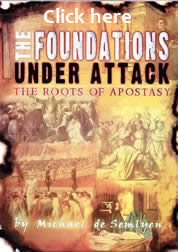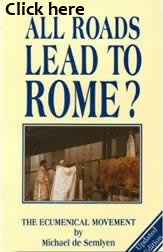|
Chapter
I
The Historical View of Prophecy and
Antichrist
The Foundations Under Attack, The Roots of
Apostasy
Author Michael de Semlyen
 There are two great truths that
stand out in the preaching that brought about the
Protestant Reformation – the "just shall live by
faith"l (not by the works of
Romanism or any other religion) and "the Papacy is the
Antichrist revealed in Scripture." It was a message
for Christ and against Antichrist. The entire
Reformation rested on this twofold testimony. In
losing the second, unquestionably we have done injury
to the first; ecumenical Christianity and "new
evangelicalism" provide abundant testimony to this. There are two great truths that
stand out in the preaching that brought about the
Protestant Reformation – the "just shall live by
faith"l (not by the works of
Romanism or any other religion) and "the Papacy is the
Antichrist revealed in Scripture." It was a message
for Christ and against Antichrist. The entire
Reformation rested on this twofold testimony. In
losing the second, unquestionably we have done injury
to the first; ecumenical Christianity and "new
evangelicalism" provide abundant testimony to this.
Iain
Murray in his book The Puritan Hope described
the Reformers as "unanimous in their belief” that the
Papal system is both the"man of sin" and the
Babylonian whore of which Scripture forewarns. Rome
was the great Antichrist, and so firmly did this
belief become established that it was not until the
nineteenth century that evangelicals seriously
questioned it.
Victorian
Bible scholar Dr. Grattan Guinness ringingly declared,
"Thousands of marlyrdoms have sealed the testimony
against the Papal antichrist, and on this testimony
rests the Reformation. To reject it is to reject the
foundation of the noblest and divinest work which has
been wrought in this world since the day of
Pentecost."

The
Protestant or Historical interpretation of prophecy
views the prophecies of Daniel, Paul, and John as
fully and faithfully laying out the entire course of
Christian history; and sees the Book of Revelation as
a pre-figuration in detail of the chief events
affecting the church and Christendom. "A great
cloud of witnesses" has given testimony to the
correctness of this view. Wycliffe, Huss, Savonarola,
Luther, Calvin, Melancthon, Zwingli, Tyndale, John
Rogers, Latimer, Ridley, Hooper, Cranmer, John Foxe,
Bunyan, the translators of the King James Bible, the
men who published the Westminster and Baptist
Confessions of Faith, Sir Isaac Newton, Wesley,
Whitefield, Jonathan Edwards, Matthew Henry and (more
recently) Spurgeon, Bishop J.C. Ryle, Hudson-Taylor.
and Dr. Martyn Lloyd-Jones – these men, among
countless others, steeped and soaked in Scripture,
recognized the office of the Papacy, the Vicar of
Christ , as "the man of sin", the new face of
the old paganism that is “MYSTERY BABYLON” in
the Bible. They saw it all in the Scriptures; it was
quickened to them. They saw the counterfeit bride, the
Harlot that would be judged at the end of history. All
of them were immensely burdened for the souls of those
in bondage to such an evil and corrupt system and
imprisoned in what Luther called "the Babylonian
Captivity of the Church." They knew that it was their
duty to view the Church of Rome as God views her and
stand clearly against all her heresies. If they were
right about this then, they are still right today.
God's Word does not change, and Rome has since added
to her many heresies.
What
Is Historicism?
The
Historicism Research Foundation has a helpful summary
on historicism on its web site:
"In brief, Historicism
teaches that biblical predictions are being fulfilled
throughout history and continue to be fulfilled today.
The Book of Revelation is a pre-written history of the
Church from the time of its writing to the future
Second Advent of Christ, which shall usher in the new
heaven and new earth."
Historicist's
agree on the following unique concepts:
● The "Year-Day" principle of
prophetic language defines a day of symbolic time as
representing a year of actual historic time.
● The "Time, Times, and Half a
Time", "3 1/2 years", "1260 days", and "42 months"
time period, which occurs seven times in Daniel and
Revelation, is understood by Historicists to be
fulfilled in history.
● All Historicists believe that
the Papacy is that Antichrist, the Man of Sin of 2
Thessalonians 2, and the Beast of Revelation 13.
● Historicists generally agree
that Revelation 9 speaks of the Muslim scourge which
afflicted Christendom.
● All Historicists agree that
the book of Revelation prophesies the history of the
Church from the Apostolic era to the future Second
Advent of Jesus Christ.
● The Historicist
interpretation was the standard interpretation from
Wycliffe to Spurgeon (spanning 500 years) and is known
as the Protestant interpretation, in distinct contrast
to Preterism and Futurism which were Jesuit
interpretations contrived during the
Counter-Reformation.
Additionally,
the Reformation confessions, including the Irish
Articles (1615), the original Westminster Confession
of Faith (1646), the Savoy Declaration (1658), and the
London Baptist Confession (1688), have adopted the
Historicist interpretation.
|

